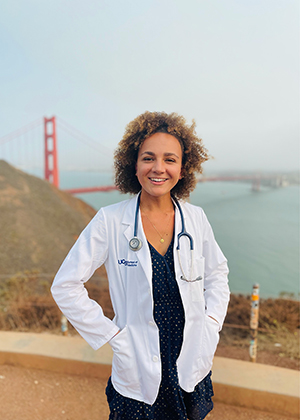A UCSF Medical Student Shares Her Summer 2022 RISE Program Experience
 Every summer, the Radiology Initiative for Scholarly Engagement (RISE Program) provides an opportunity for high school, college, and medical students to participate in basic science, translational, or clinical radiology research projects. For eight weeks, students work with a faculty mentor on a research project. The student's research experience culminates in an abstract to be submitted for presentation at the department Summer Students Symposium.
Every summer, the Radiology Initiative for Scholarly Engagement (RISE Program) provides an opportunity for high school, college, and medical students to participate in basic science, translational, or clinical radiology research projects. For eight weeks, students work with a faculty mentor on a research project. The student's research experience culminates in an abstract to be submitted for presentation at the department Summer Students Symposium.
We asked Lucia, a MS2 student at UCSF who participated in the program during Summer 2022, to share her thoughts about her experience.
How did you find out about the UCSF RISE Program and what made you decide to apply?
I found out about the UCSF RISE Program by attending a Women in Radiology interest group talk. One of the upper classmen shared her experience in the program. She only had great things to say, and I was extremely intrigued. I did some research into the program and the more I learned, the more I wanted to apply. I already established an interest in radiology and was thrilled with the opportunity to learn more about career options. I knew by participating in the RISE program I would be surrounded by a community of diverse individuals who wanted to see me succeed in the field.
What interests you most about radiology and biomedical imaging?
Radiology seems to be an interesting clinical specialty that requires a broad knowledge base of technology and clinical medicine that I find fascinating. When shadowing in the reading room, I loved watching the attending radiologist interact with physicians from a variety of different fields (critical care, oncology, internal medicine, etc.). I want that aspect of consulting and advising specialists from various fields to be incorporated in my future career.
Tell us about the projects you worked on this summer
I worked under Melanie Morrison, PhD in the Lupo Lab investigating fractional anisotropy as a predictor of Deep Brain Stimulation (DBS) motor outcomes in patients with Parkinson's Disease (PD). I reviewed T1 weighted MRI images of patients prior to undergoing DBS implantation. Using the FSL toolbox I reconstructed a white matter map from these MRI images and using these maps I was able to extract the fractional anisotropy values. I then went through Apex and pulled clinical data including medications, age, baseline motor functioning, to compare against the fractional anisotropy values for each patient. We are still in the process of conducting multivariate analyses.
What did you find most useful and enjoyable about the program?
The highlight of the RISE program was having the opportunity to work closely with Dr. Morrison. She guided me through the project and was always available when I had any questions or concerns. Thanks to Dr. Morrison and the UCSF RISE Program I know I have what it takes to succeed in fields that are not historically representative of people like me.
What are your future career plans/goals?
I'm currently in my second year of medical school and in my future, I see myself working as a physician scientist uplifting underrepresented communities via mentorship.
RISE is a new research and academic career development program funded by the Department of Radiology and Biomedical Imaging and developed by the department's Outreach and Opportunity committee. The program provides unique research experiences and focused mentorship to students with commitments to advancing and sustaining opportunity inclusive to all communities and/or coming from a medically, economically, or educationally disadvantaged populations.. Our goal is to provide an early opportunity for students to explore radiology as a career choice and support the next wave of innovation in our field. Learn more.
